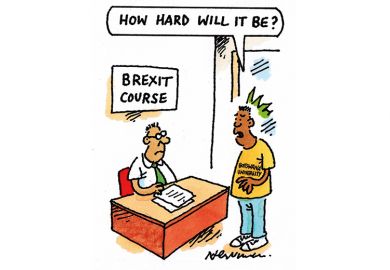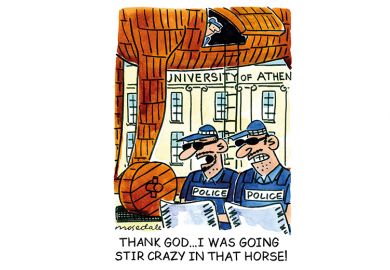
Oscar-winning actor Matthew McConaughey will join the University of Texas at Austin as a professor of practice in its department of radio-television-film, the institution announced. Mr McConaughey, a film graduate of the university and an avid fan of its Texas Longhorns American football team, has been a visiting instructor at UT Austin since 2015 and will continue teaching the “script to screen” film production class he has developed. “It’s the class I wish I would have had when I was in film school. Working in the classroom with these students gives me a chance to prepare them,” Mr McConaughey said. It is probably for the best that there was no mention of any salary, given that the actor previously left US higher education dazed and confused when he picked up a $135,000 (£111,709) fee from the University of Houston to deliver its 2015 commencement address.
If you have long been a leading light in your academic field, what could you do to cement your contribution to knowledge? Hurry up and die, suggests a new study. “The deaths of prominent researchers are often followed by a surge in highly cited research by newcomers to those fields,” according to researchers at the Massachusetts Institute of Technology, University of California, Merced and University of California, San Diego. Their paper, “Does Science Advance one Funeral at a Time?”, studied what occurred after the unexpected deaths of 452 life scientists, and found an average 8.6 per cent increase in the number of articles published by researchers who had not previously collaborated with those star scientists. The authors speculate that senior academics may exert considerable influence over journals and grant awards, making it harder for outsiders to make a mark. But, as they say in the business, further studies are required before universities start encouraging ageing researchers to expense their one-way tickets to Swiss clinics.
Prospective students wanting to know which UK university will set them up for a well-paid career should watch BBC Two’s University Challenge rather than examine the results of the teaching excellence framework, according to researchers. Katarzyna Zdunczyk and Marco Mongiello of the University of Surrey analysed the number of times that a university’s team had qualified to appear in the BBC programme, and found that the results correlated well with the earnings of the institute’s graduates at age 29. The results of the TEF, which rates institutions as gold, silver or bronze according to a range of student outcome metrics, correlated less well with graduate salaries, the researchers were due to tell the British Academy of Management’s conference on 5 September. “There is a correlation between appearing on University Challenge and higher real earnings. There is no correlation between TEF gold and silver and higher earnings,” Professor Mongiello said.
World leaders are increasingly likely to have been educated in the US rather than in the UK, a new study says. The annual “soft power” rankings compiled by the Higher Education Policy Institute shows that 62 world leaders went to university stateside, compared with 59 in the UK, according to results published on 5 September. Two years ago the UK was ahead of the US by 58 to 57. Over the same period, the number of world leaders who were educated in France has increased from 34 to 40. “As the UK struggles to find its new place in the world, it may need to rely on the potential benefits from soft power even more than in the past,” said Hepi’s director, Nick Hillman. “Given that the UK’s international student numbers have flatlined in recent years while countries like Australia have been forging ahead, this won’t be easy.”
UK universities have brought media and political opprobrium on themselves with their failings on vice-chancellors’ and senior managers’ pay – but the case of a £2.25 expenses claim at Nando’s reported by the Mail on Sunday is unlikely to bring further calls for meatier regulation. Freedom of Information request findings reported by the newspaper said the University of Cambridge spent “£39,749 booking staff into five-star hotels, including the Hong Kong Four Seasons, Singapore’s Fullerton Hotel and the Taj Mahal Palace in Mumbai” over three years. And the newspaper found that university staff “also claim for more minor outlays such as £2.25 in chicken restaurant Nando’s” – an expenses entry from Newcastle University’s senior team. By comparison with the more outrageous pay and benefits packages in the sector, that seems peri peri tame.
Register to continue
Why register?
- Registration is free and only takes a moment
- Once registered, you can read 3 articles a month
- Sign up for our newsletter
Subscribe
Or subscribe for unlimited access to:
- Unlimited access to news, views, insights & reviews
- Digital editions
- Digital access to THE’s university and college rankings analysis
Already registered or a current subscriber?




